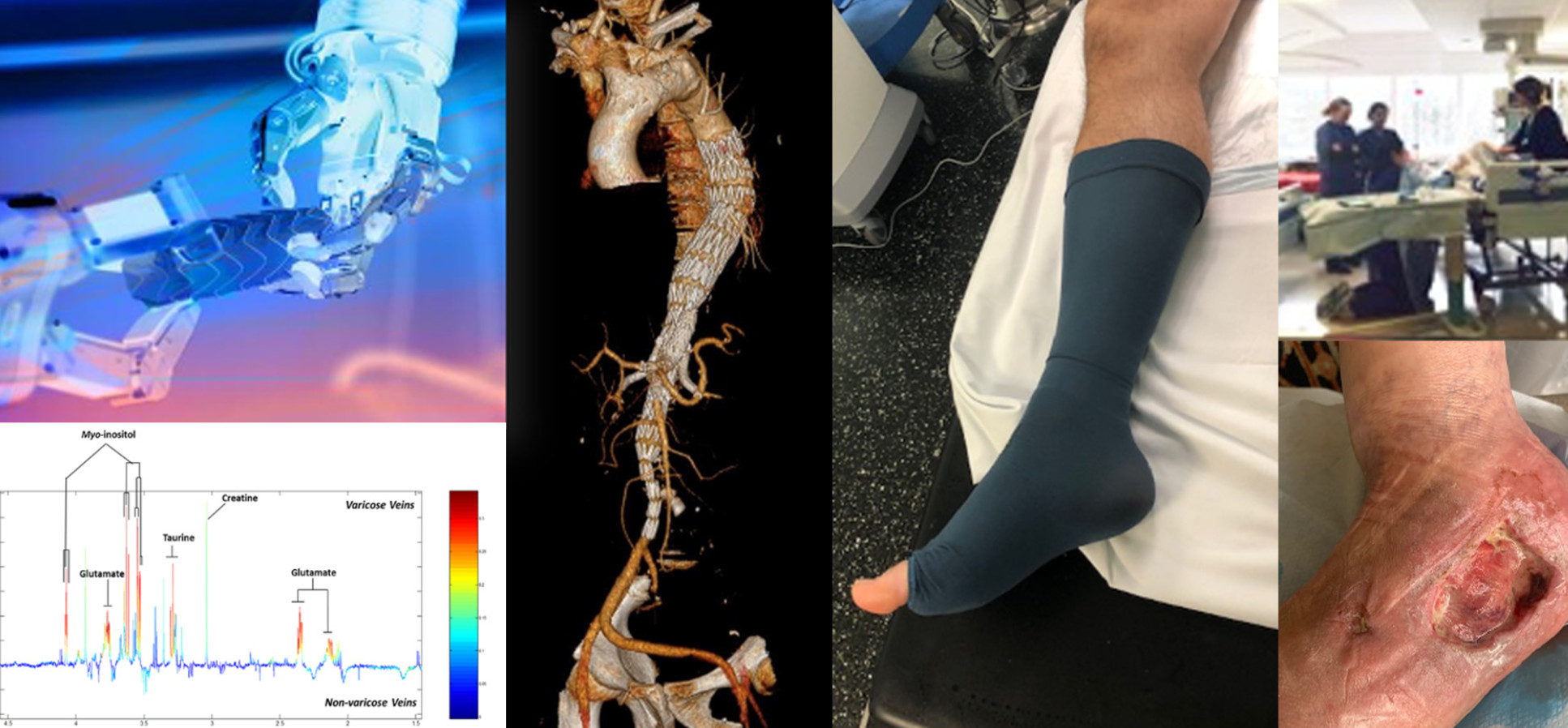
Contact
Professor Alun Davies
a.h.davies@imperial.ac.uk
+44 (0)20 3311 7309
Kathy Lewis (Divisional Manager, Department of Surgery and Cancer)
kathy.lewis@imperial.ac.uk
What we do
The Section of Vascular Surgery is an active, internationally renowned academic unit, which conducts research in the field of vascular disease and associated therapies. The Section has conducted several high-profile and influential randomised controlled trials and has a proven track record of attracting significant grant funding in addition to conducting and producing high-impact research.
Why it is important
Developing and investigating the efficacy and cost-effectiveness of novel and existing therapies, novel biomarker development, procedures and clinical pathways for the management of arterial and venous disease will help to identify the best treatments. Determining the most effective methods for training high performing teams will ensure that these optimal treatments are delivered effectively to patients. Together these are vitally important from a patient, healthcare provider and commissioner perspective alike.
How it can benefit patients
Our research aims to improve patient outcomes in the identification of novel diagnostic biomarkers, treatments and through optimising the use of existing therapies. The Section hosts an active Patient and Public Involvement (PPI) group comprising patients, carers and other members of the public; all of whom consult on research proposals and procedures to ensure that all research is of direct patient benefit.
Summary of current research
Research streams investigate a broad range of topics in both the arterial and venous system including;
- Translational molecular research - focusing on metabonomics, in a range of venous and arterial conditions. (Lead: Alun Davies & Joseph Shalhoub)
- Population venous studies - With the support of the National Institute for Heath and Care Excellence (NICE) we are conducting population studies on chronic venous disease and VTE thrombosis. (Lead: Alun Davies)
- Clinical trials - in the areas of chronic venous disease, intermittent claudication and rehabilitation following surgery (see ‘Clinical Trials’ section). (Lead: Alun Davies & Joseph Shalhoub)
- Robotic surgery & engineering - Design of micro-robotic systems for use in the vascular tree alongside the Hamlyn Centre and with EPSRC funding; first in man use and evaluation of clinical robotic systems; and studies of advanced imaging, sensing and wearables. (Lead: Celia Riga, Colin Bicknell & Mo Hamady)
- Behavioural Science and Vascular Surgery - The application of behavioural science to vascular pathology including aortic and venous disease is an area of interest we have developed as an ongoing collaboration with a team of Behavioural Scientists at University College London. (Lead: Alun Davies)
- Simulation and Training - Research is ongoing to determine the optimal methods to train high performing teams using simulated environments. (Lead: Colin Bicknell & Celia Riga)
- Clinical Aortic studies - We are hosting a number of clinical studies to assess novel technologies, including the use of novel stent graft systems and CO2 flushing to reduce the risk of stroke during thoracic stent grafting; to assess drugs that may slow the progression of aortic disease; examine innovative pathways to treat aortic disease such as day case surgery; and the study of error during aortic intervention. (Lead: Colin Bicknell, Celia Riga, Michael Jenkins, Janet Powell, Mo Hamady & Richard Gibbs)
- Outcomes research in Aortic Disease - Studies to understand the inequality that exists in outcomes for men and women being treated for aortic conditions and the relationship between blood pressure and aortic outcomes is underway. (Lead: Colin Bicknell and Janet Powell)
- Biomechanics of Aortic dissection – ongoing collaboration with chemical engineering using computational flow simulation of aortic dissection to predict outcomes and optimal treatments. (Lead: Richard Gibbs and Yun Xu)
- Trauma research - There is a growing portfolio of research projects around Major Trauma, ranging from basic science to clinical trials. Current, future and completed projects include the effects of missed vascular injury, pulse oximetry in diagnosis/management of vascular trauma and the metabolic profiling of severely injured patients. (Lead: Mr Christopher Aylwin).
- Frailty and prehabilitation in vascular surgery – A number of studies are investigating the ways in which peri- and post-operative outcomes can be improved (e.g. investigation into pre- and rehabilitation programmes) The effect of sarcopenia in vascular patients is being investigated, initially in aortic patients. (Lead: Alun Davies, Tristan Lane, Ganan Sritharan & Andrea Rockall)
- Diabetic foot disease- work ranging from diagnosis to the reversal of neuropathy with neuromuscular stimulation is ongoing (Lead: Usman Jaffer, Joseph Shalhoub & Alun Davies)
- Ultrasound waveform analysis – improving diagnostic accuracy of non invasive imaging. Novel techniques using Doppler as well as ultrasound speckle analysis and machine learning are being applied to diabetic lower limb arterial assessment, dialysis fistula assessment and bypasss graft surveillance (Lead: Usman Jaffer)
- Communities of Practice (CoP) for healthcare – use of artificial intelligence to help establish psychographics and personailsed healthcare in a variety of clinical settings. Virtual CoP may be an effective strategy in delivering and accessing healthcare content for people seeking information. Further improvement in engagement is being evaluated by modelling individuals’ engagement with content using AI and physiological signals (Lead: Usman Jaffer).
- Heart Rate Variability (HRV) for assessing team function. Synchronisations in HRV using wearable devices show correlation with team functional outcomes in the operating theatre. Further refinement of HRV synchrony algorithms using AI is being evaluated for development of early warning system for poor team cohesiveness potentially resulting in intra-operative glitches (Lead: Usman Jaffer in collaboration with Prof Danilo Mandic, Department of Signal Processing).
Additional information
- Funders
- Related Centres and industry
- Collaborators
- PhD/MD students
- Clinical trials & other research
- For patient
- British Heart Foundation
- British Society of Endovascular Therapy (BSET)
- Circulation Foundation
- The Dunhill Medical Trust
- Engineering & Physical Sciences Research Council (EPSRC)
- Graham Dixon Charitable Trust
- Sir Halley Stewart Trust
- Heart Research UK
- Imperial Health Charity
- The Jon Moulton Charity Trust
- National Institute for Health Research (NIHR)
- Public Health England
- Stroke Association
Internal
- Professor Ferdinando Rodriguez Y Baena (Co-Director of Hamlyn Centre, Professor of Medical Robotics)
- Professor the Lord Ara Darzi (Co-Director of the IGHI, Professor of Surgery) Professor of Surgery)
- Professor Dan Elson (Professor of Surgical Imaging)
- Ms Emanuela Falaschetti (Research Fellow in Clinical Trial Statistics)
- Dr Francesca Fiorentino (Research Fellow/Clinical Trial Statistician)
- Professor Julian Griffin (Chair in Biological Chemistry)
- Dr Gaia Kiru (Commercial Operations Manager)
- Professor Mike Laffan (Professor of Haemostasis & Thrombosis)
- Professor Alison McGregor (Professor of Musculoskeletal Biodynamics)
- Professor Azeem Majeed (Professor of Primary Care and Public Health)
- Dr George Mylonas (Director of the HARMS Lab: Human-centred Automation, Robotics and Monitoring for Surgery)
- Professor Nick Oliver (Wynn Chair in Human Metabolism)
- Professor Declan O’Regan (Professor of Imaging Sciences)
- Professor Neil Poulter (Professor of Preventive Cardiovascular Medicine)
- Professor Andrea Rockall (Clinical Chair of Radiology)
- Dr Michael Soljak (Honorary Clinical Research Fellow)
- Professor Zoltan Takats (Professor of Analytical Chemistry)
- Professor Mary Wells (Professor of Practice)
- Professor Eric Yeatman: (Head of Department of Electrical and Electronic Engineering)
- Professor Xiao Yun Xu (Professor of Biofluid Mechanics)
External
- Dr Una Adderley (Director of the National Wound Care Strategy Programme)
- Professor Matt Bown (Professor of Vascular Surgery, University of Leicester)
- Professor Andrew Bradbury (Sampson Gamgee Professor of Vascular Surgery, University of Birmingham)
- Dr Charlotte Bradbury (Senior Lecturer, University of Bristol)
- Mr Rob Brightwell (Consultant Vascular Surgeon, Norfolk and Norwich University Hospitals NHS Foundation Trust)
- Dr Nick Burfitt (Interventional and diagnostic radiology consultant, Imperial College Healthcare NHS Trust)
- Mr Daniel Carradice, (Senior Clinical Lecturer, Hull York Medical School)
- Professor Ian Chetter, (Professor of Surgery, Hull York Medical School)
- Mr Patrick Chong (Consultant Vascular Surgeon, Frimley Health NHS Foundation Trust)
- Professor Dame Nicola Cullum (Professor of Nursing, The University of Manchester)
- Professor Michael Edmonds (Consultant Diabetologist and Professor of Diabetic Foot Medicine, King's College Hospital NHS Foundation Trust)
- Dr David Epstein (Associate Professor, University of Granada)
- Mr Seamus Harrison (Senior Clinical Fellow, University of Cambridge)
- Mr Shehan Hettiaratchy (Consultant plastic, hand and reconstructive surgeon, Imperial College Healthcare NHS Trust)
- Professor Robert Hinchcliffe (Professor of Vascular Surgery, University of Bristol)
- Professor Rob Horne (Professor of Behavioural Medicine, University College London)
- Professor Beverley Hunt (Professor of Haemostasis and Thrombosis, King’s College London)
- Professor Christopher Imray (Renal Transplant Surgeon, University Hospitals Coventry and Warwickshire NHS Trust)
- Dr Ieuan Harri Jenkins (Consultant Neurologist, Imperial College Healthcare NHS Trust)
- Dr Jason Johnson (Associate Professor, University of Bristol)
- Dr Stavros Kakkos (Associate Professor, University of Patras)
- Dr Barry Katzen (Director of Miami Cardiac and Vascular Institute)
- Professor Kamlesh Khunti (Professor of Primary Care Diabetes and Vascular Medicine, University of Leicester)
- Dr Peter MacCallum (Senior Lecturer in Haematology, Queen Mary University of London)
- Professor Hugh Markus (Professor of Stroke Medicine, University of Cambridge)
- Professor Manuel Mayr (British Heart Foundation Professor of Cardiovascular Proteomics, King’s College London)
- Professor Claudia Monaco (Professor of Cardiovascular Inflammation, University of Oxford)
- Professor Elias Mossialos (Brian Abel-Smith Professor of Health Policy, London School of Economics)
- Professor John Norrie (Professor of Medical Statistics and Trial Methodology/Director of Edinburgh Clinical Trials Unit, The University of Edinburgh)
- Professor John Pasi (Professor of Haemostasis and Thrombosis, Queen Mary University of London)
- Dr Joseph Raffetto (Assistant Professor of Surgery, Boston University)
- Professor Barnaby Reeves (Professorial Fellow in Health Services Research, University of Bristol)
- Mr Athanasios Saratzis (Associate Professor of Vascular Surgery, University of Leicester)
- Dr Ganan Sritharan (Consultant Geriatrician, Imperial College Healthcare NHS Trust)
- Professor Gerard Stansby (Professor of Vascular Surgery, Newcastle University)
- Dr Simon Stanworth (Associate Professor of Haemotology and Transfusion Medicine, University of Oxford)
- Professor Danail Stoyanov (Professor of Robot Vision, Director of the Wellcome/EPSRC Centre for Interventional and Surgical Sciences (WEISS), University College London)
- Dr Michael Sweeting (Associate Professor of Biostatistics, University of Leicester)
- Professor Jonathan Valabji (Consultant Diabetologist and Professor of Practice, Diabetes, Imperial College Healthcare NHS Trust)
- Dr Isabelle Van Herzeele (Vascular Surgeon, Ghent University)
- Professor Tom Wakefield (Professor of Vascular Surgery, University of Michigan)
- Professor Anders Wanhainen (Professor of Vascular Surgery, University of Uppsala, Sweden)
Ammar Abdullah - The development and testing of implantable position monitoring devices for monitoring aortic stent graft migration after vascular interventions
Andrew Batchelder - Reduction of error in the theatre environment through team training: effectiveness and cost evaluation
Amjad Belramman - Outcomes of endovenous management of lower extremity varicose veins
Raminta Cerneviciute - The relationship between blood pressure variability and disease progression in type B aortic dissection patients
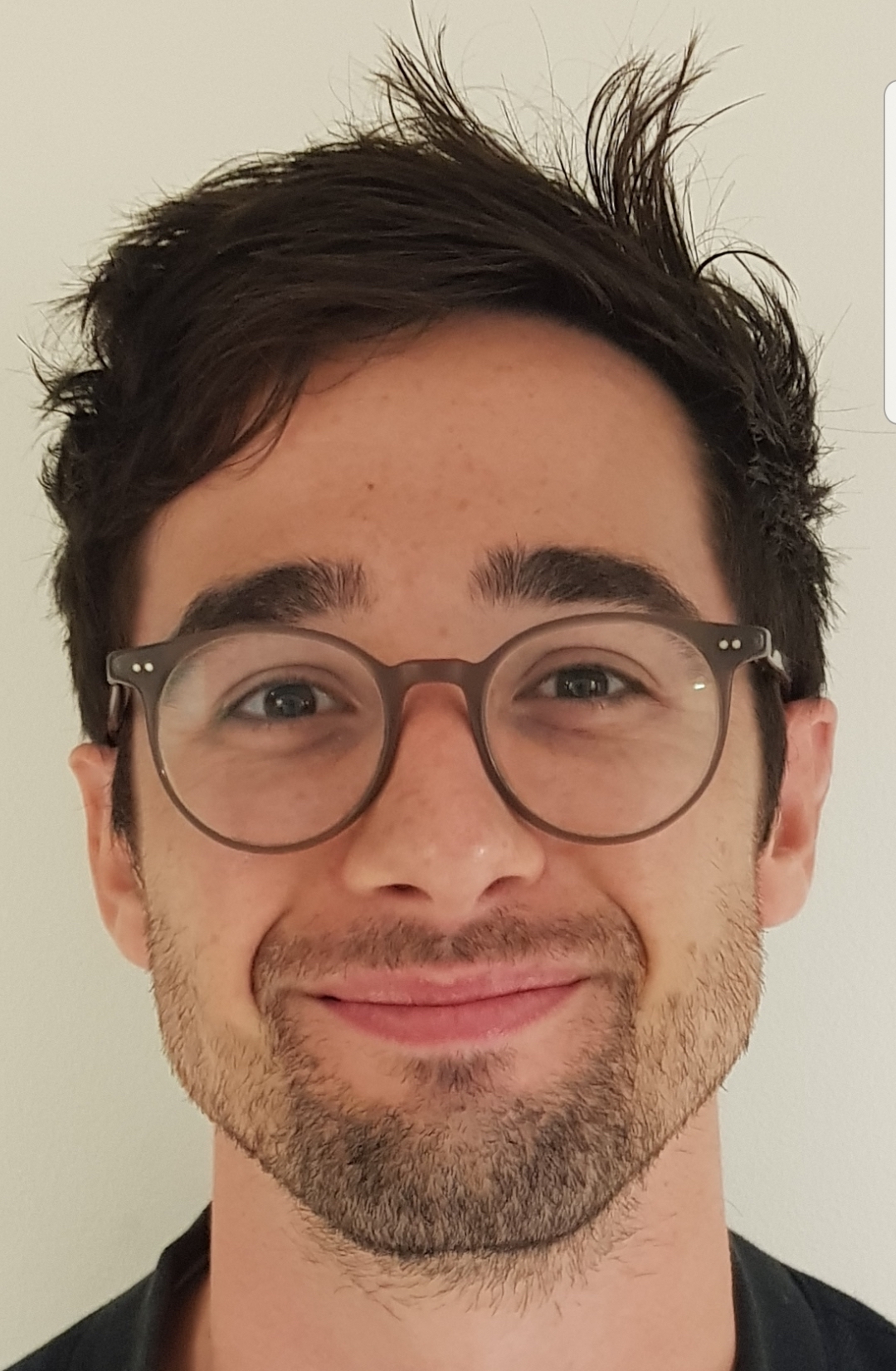
Edmund Charles - Central blood pressure variability and the size and growth rates of abdominal aortic aneurysms
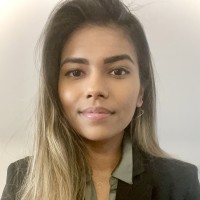 Jaya Choudhury - Metabolic profiling of diabetic foot ulceration
Jaya Choudhury - Metabolic profiling of diabetic foot ulceration
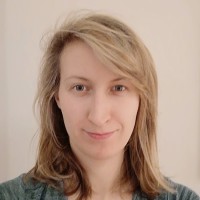 Madelaine Gimzewska - Metabolic profiling of limb ischaemia and reperfusion injury
Madelaine Gimzewska - Metabolic profiling of limb ischaemia and reperfusion injury
Lydia Hanna - Investigation of the effect of CO2 flushing to reduce cerebral emboli in TEVAR
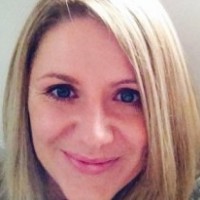 Francine Heatley - Leg ulcer outcomes
Francine Heatley - Leg ulcer outcomes
Kemal Kemal - Metabolic profiling of deep venous thrombosis
Trevor Kwok - Robotic solutions for endovascular intervention
Abigail Morbi - Shared medical appointments in the elective surgical pathway and management of chronic disease
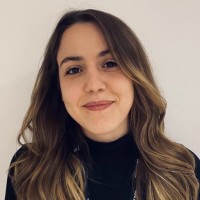 Maria Nicola - The eligibility, applicability, clinical effectiveness and cost effectiveness of a short stay EVAR programme
Maria Nicola - The eligibility, applicability, clinical effectiveness and cost effectiveness of a short stay EVAR programme
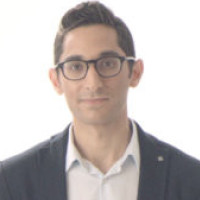 Pasha Normahani - Diagnosis of arterial disease in diabetes
Pasha Normahani - Diagnosis of arterial disease in diabetes
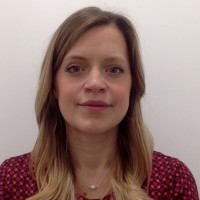 Anna Pouncey - Investigating sex-specific differences in peri-operative mortality and morbidity following elective abdominal aortic aneurysm repair
Anna Pouncey - Investigating sex-specific differences in peri-operative mortality and morbidity following elective abdominal aortic aneurysm repair
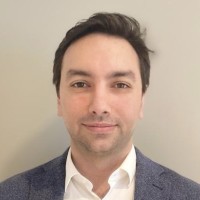 Majd Rawashdeh - Prehabilitation in abdominal aortic aneurysm surgery
Majd Rawashdeh - Prehabilitation in abdominal aortic aneurysm surgery
Safa Salim - Epidemiology of chronic venous disease
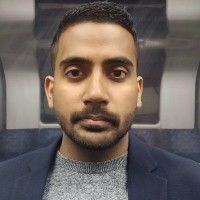 Abhilash Sudarsanam - Sarcopenia in patients with abdominal aortic aneurysms (AAA)
Abhilash Sudarsanam - Sarcopenia in patients with abdominal aortic aneurysms (AAA)
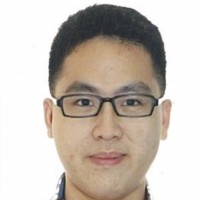 Matthew Tan - Systems Biology Approaches to Venous Leg Ulceration
Matthew Tan - Systems Biology Approaches to Venous Leg Ulceration
Ongoing, funded studies
- GRACE - PI: Professor Alun Davies, Funder: NIHR-HTA
- VEIN - PI: Professor Alun Davies, Funder: NIHR-HTA Accelerator grant
- PAEDIS - Designing a platform trial to assess the effectiveness of interventions for peripheral arterial disease: The PAEDIS trial development project; NIHR 155342: Imperial College London
- THRIVE Trial - PI: Professor Alun Davies, Funder: NIHR-HTA
- DM PAD Trial Co-ordinating Centre - PI: Professor Alun Davies, Funder: NIHR-HTA
- Compression Hosiery to Avoid Post-Thrombotic Syndrome (CHAPS) - PI: Professor Alun Davies, Funder: NIHR-HTA
- Does Neuromuscular Electrical Stimulation Improve the Absolute Walking Distance in Patients with Intermittent Claudication (NESIC) compared to best available treatment? - PI: Professor Alun Davies, Funder: NIHR-EME
- Decellularised Dermis Allograft for the Treatment of Chronic Venous Leg Ulceration (DAVE) - PI: Professor Alun Davies, Funder: The Jon Moulton Charitable Trust
- Neuromuscular Electrical Stimulation For The Treatment of Diabetic Peripheral Neuropathy. CI: Professor Alun Davies, Funder: Actegy Health Ltd.
- Neuromuscular Stimulation for Rehabilitation after general and vascular surgery - a pilot randomised clinical study. PI: Professor Alun Davies, Funder: The Jon Moulton Charitable Trust.
- PETS Trial - PI: Professor Alun Davies, Funder: NIHR
- The British Society of Endovascular Therapy -ConformabLe EndoVascular Aneurysm Repair Registry: A prospective, multi-centre, observational cohort study. (BSET-CLEVAR Registry) - PI: Mr Colin Bicknell. Funder: BSET with funds from W.L. Gore & Associates.
- A pilot randomised controlled trial of carbon-dioxide use versus saline flushing to reduce neurological brain injury during thoracic aortic stenting - PI: Mr Richard Gibbs, Funder: The Jon Moulton Charitable Trust and Heart Research UK.
- TAMBE Registry: IDE prospective, non-randomized multicentre study of a new branched thoracoabdominal endograft - PI: Mr Richard Gibbs. Funder: W.L. Gore & Associates.
- Development of a core outcome set for clinical studies reporting the outcomes of patients undergoing repair of degenerative infrarenal abdominal aortic aneurysms - PI: Professor Janet Powell, Funder: European Society of Vascular Surgery.
- Detection of EVAR sac expansion using ultrasound surveillance (DETECT) - PI: Professor Roger Greenhalgh, Funder: Camelia Botnar Arterial Research Foundation.
- Patients’, carers’, and nurses’ experience of the referral pathway from primary to secondary care in the context of venous leg ulceration - PI: Professor May Wells, Funder: Imperial Health Charity.
- ShorT stay Aneurysm Repair (STAR): A 23-hour endovascular abdominal aortic aneurysm repair pathway with evaluation of eligibility, uptake, viability, acceptability, safety and cost PI: Mr Colin Bicknell, Funder: W. L. Gore & Associates (UK) Ltd and Medtronic Limited.
Completed
- Graduated compression as an Adjunct to Pharmacoprophylaxis in Surgery (GAPS) - PI: Professor Alun Davies, Funder: NIHR-HTA (2016-2020)
- Early Venous Reflex Ablation (EVRA) Ulcer Trial - PI: Professor Alun Davies, Funder: NIHR-HTA (2013-2020)
- Multicentre observational study of surgical system failures in aortic procedures and their effect on patient outcomes (LEAP) - PI: Mr Colin Bicknell, Funders: Circulation Foundation, NIHR, Imperial College Healthcare NHS Trust, Imperial College London
- Randomized Controlled Trial of Compression After Endovenous Thermal Ablation of Varicose Veins (COMETA) - PI: Professor Alun Davies, Funder: Graham-Dixon Charitable Trust (2015-2019)
- An evaluation of the effect of an angiotensin-converting enzyme (ACE) inhibitor on the growth rate of small abdominal aortic aneurysm – AARDVARK - PI: Professor Neil Poulter, Funder: NIHR-HTA (2011-2016)
- The UK EndoVascular Aneurysm Repair Trials (EVAR) - PI: Professor Roger Greenhalgh, Funder NIHR-HTA (1999-2015)
- Immediate Management of Patients with Ruptured Aneurysm: Open Versus Endovascular Repair (IMPROVE) - PI: Professor Janet Powell, Funder: NIHR-HTA
- Late aneurysm-related mortality up to 15 years, secondary endovascular repair, late sac rupture risk, costs & cost effectiveness implications in the United Kingdom EndoVascular Aneurysm Repair randomised controlled trials and management of type II endoleaks -PI: Professor Roger Greenhalgh, Funder: NIHR-HTA
- Incentives in Diabetic Eye Assessment by Screening (IDEAS) Trial - PI: Mr Colin Bicknell, Funder: NIHR-HS&DR (2014-2017)
- A national evaluation of error in the vascular and endovascular operating environment - PI: Mr Colin Bicknell, Funder: Circulation Foundation Presidents Early Career Award
- Wearable Sensor Technology Efficacy In Peripheral Vascular Disease (wSTEP): A Randomized Controlled Trial - PI: Miss Celia Riga, Funder: National Institute for Health Research (NIHR) Biomedical Research Center. (2013-2016)
- Ambulatory Varicosity avUlsion Later or Synchronised (AVULS): A Randomised Clinical Trial - PI: Professor Alun Davies, Funder: The Graham Dixon Charitable Foundation and by the National Institute for Health Research (NIHR) Biomedical Research Centre (2011-2015)
- Vein Graft Surveillance Randomised Trial (VGST) - PI: Professor Alun Davies, Funder: British Heart Foundation.
- Stroke Prevention: Cerebral Embolic Protection Device and Reduction of Neurological Injury in Thoracic Aortic Stenting - PI: Mr Richard Gibbs. Funder: Stroke Association
- Computational Flow Modelling of thrombosis in Type B Dissection - PI: Mr Richard Gibbs. Funder: GORE Medical
- Surgery, Complications, and Quality of Life: A Longitudinal Cohort Study Exploring the Role of Psychosocial Factors - PI: Professor Ara Darzi, Funder: National Institute for Health Research (NIHR) Imperial Patient Safety Translational Research Centre
- Patient-specific Rehearsal Before EVAR: Influence on Technical and Nontechnical Operative Performance. A Randomized Controlled Trial - Funders: Imperial BRC, Simbionix USA Corp, Cleveland, OH, USA (technical support), W.L. Gore & Associates Inc, Flagstaff, Arizona, USA (research grant), and Medtronic Inc., Santa Rosa, California, USA (research grant). (2013-2015)
- Testing for Arterial disease in Diabetes (TrEAD) Study - CI: Mr Usman Jaffer, Funder: Chelsea and Westminster Plus (CW+) Charity (2019-2020)
- British Heart Foundation
- Circulation Foundation
- Diabetes UK
- Imperial Clinical Trials Unit (contains information about participating in research)
- Lindsay Leg Club
- Thrombosis UK
Group leads
Professor Alun Davies
/prod01/channel_3/media/images/people-list/AHD2.jpg)
Professor Alun Davies
Professor of Vascular Surgery and Head of Section
Miss Celia Riga
/prod01/channel_3/media/migration/faculty-of-medicine/celia-riga_1611931700699_x4.jpg)
Miss Celia Riga
HEE London Head of School of Surgery
Mr Richard Gibbs
/prod01/channel_3/media/migration/faculty-of-medicine/richardgibbs_1611931888803_x4.jpg)
Mr Richard Gibbs
Clinical Director of Surgery
Professor Janet Powell
/prod01/channel_3/media/migration/faculty-of-medicine/janet-powell_1611931990298_x4.jpg)
Professor Janet Powell
Emeritus Professor
Mr Usman Jaffer
/prod01/channel_3/media/migration/faculty-of-medicine/1517561891251_1611932162740_x4.jpg)
Mr Usman Jaffer
Honorary Clinical Senior Lecturer
Mr Joseph Shalhoub
/prod01/channel_3/media/migration/faculty-of-medicine/joseph-shalhoub_1611932259772_x4.jpg)
Mr Joseph Shalhoub
Honorary Clinical Senior Lecturer
Mr Christopher Aylwin
/prod01/channel_3/media/migration/faculty-of-medicine/christopher-aylwin_1611932352816_x4.jpg)
Mr Christopher Aylwin
Honorary Clinical Senior Lecturer
Researchers
Miss Sarah Onida
/prod01/channel_3/media/migration/faculty-of-medicine/sarah-onida_1611932517398_x4.jpg)
Miss Sarah Onida
Clinical Lecturer in Vascular Surgery
Mr Guy Martin
/prod01/channel_3/media/migration/faculty-of-medicine/helix-headshot-1610726521256-x1_1611932594139_x4.jpg)
Mr Guy Martin
Clinical Lecturer in Vascular Surgery
Professor Roger Greenhalgh
/prod01/channel_3/media/migration/faculty-of-medicine/portrait_1611932699537_x4.jpg)
Professor Roger Greenhalgh
Emeritus Professor
Professor David Nott, OBE
/prod01/channel_3/media/migration/faculty-of-medicine/david-nott_1611932823638_x4.jpg)
Professor David Nott, OBE
Clinical Reader and Professor of Practice (Surgery)
Professor Mo Hamady
/prod01/channel_3/media/migration/faculty-of-medicine/mo1-tojpeg-1544550635152-x1_1611932906153_x4.jpg)
Professor Mo Hamady
Professor of Practice (Interventional Radiology)
Professor Andrea Rockall
/prod01/channel_3/media/migration/faculty-of-medicine/ar-pic-2015-tojpeg-1537786536779-x1_1611933009639_x4.jpg)
Professor Andrea Rockall
Clinical Chair in Radiology
Mr Tristan Lane
/prod01/channel_3/media/migration/faculty-of-medicine/photo-on-03-12-2018-at-15-08-tojpeg-1543849851624-x1_1611933092805_x4.jpg)
Mr Tristan Lane
Honorary Clinical Senior Lecturer
Mr Michael Jenkins
/prod01/channel_3/media/migration/faculty-of-medicine/michael-jenkins_1611933209540_x4.jpg)
Mr Michael Jenkins
Honorary Clinical Senior Lecturer
Mr Manjit Gohel
/prod01/channel_3/media/migration/faculty-of-medicine/d1490aed51bb7d9a87d014129b0eac7b_1611933331368_x4.jpg)
Mr Manjit Gohel
Honorary Clinical Senior Lecturer
Professor George Geroulakos
/prod01/channel_3/media/migration/faculty-of-medicine/mr-geroulakos_1612191433841_x4.jpg)
Professor George Geroulakos
Visiting Professor
Mr Matthew Machin
/prod01/channel_3/media/migration/faculty-of-medicine/matthew-machin_1612021094365_x4.jpg)
Mr Matthew Machin
Academic Clinical Fellow
Layla Bolton Saghdaoui
/prod01/channel_3/media/migration/faculty-of-medicine/layla-bolton_1612021174443_x4.jpg)
Layla Bolton Saghdaoui
Pre-doctoral Fellow
Simona Racaru
/prod01/channel_3/media/migration/faculty-of-medicine/holding-png-tojpeg-1564655919889-x2_1612021278552_x4.jpg)
Simona Racaru
Pre-doctoral Fellow
Xun Luo
/prod01/channel_3/media/migration/faculty-of-medicine/xun-luo5_1612021452695_x4.jpg)
Xun Luo
Clinical Research Fellow
Jason Lawson
/prod01/channel_3/media/migration/faculty-of-medicine/jason-lawson-1595597982753-x2_1612021543857_x4.jpg)
Jason Lawson
Teaching Fellow
Megumi Nimura
/prod01/channel_3/media/migration/faculty-of-medicine/megumi-nimura_1612021651162_x4.jpg)
Megumi Nimura
Research Nurse
Clinical Trial Managers
Sasha Smith
/prod01/channel_3/media/migration/faculty-of-medicine/sasha-smith_1612021975916_x4.jpg)
Sasha Smith
Clinical Trial Manager
Francine Heatley
/prod01/channel_3/media/migration/faculty-of-medicine/portrait-2_1612022059768_x4.jpg)
Francine Heatley
Clinical Trials Manager
Rebecca Lawton
/prod01/channel_3/media/migration/faculty-of-medicine/rebecca-lawton-tojpeg-1583841641281-x2_1612022189969_x4.jpg)
Rebecca Lawton
Clinical Trial Manager
Laura Burgess
/prod01/channel_3/media/migration/faculty-of-medicine/thumbnail-image_1612279323837_x4.jpg)
Laura Burgess
Clinical Trial Manager
Dr Pinar Ulug
/prod01/channel_3/media/migration/faculty-of-medicine/portrait-3_1612022431933_x4.jpg)
Dr Pinar Ulug
Clinical Trial Manager
Sarrah Peerbux
/prod01/channel_3/media/migration/faculty-of-medicine/sarrah-peerbux_1612022559711_x4.jpg)
Sarrah Peerbux
Clinical Trial Manager
Sarah Whittley
/prod01/channel_3/media/images/people-list/Whittley.jpg)
Sarah Whittley
Clinical Trial Manager
/prod01/channel_3/media/migration/faculty-of-medicine/colin-bicknell_1611931495290_x4.jpg)